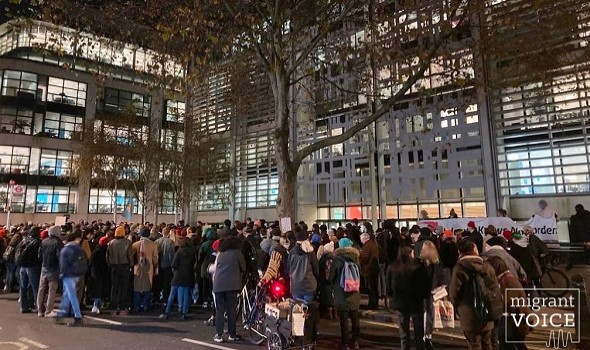On this bitterly cold night
On this bitterly cold night

FRIDAY 26 NOVEMBER, 2021
I did feel numb when I heard the devastating yet predictable news of a tragedy, that at least 27 people died while trying to cross the Channel to seek safety in the UK. A tragedy that is purely man-made: the UK government could establish a safe and legal route for people to travel to claim asylum here. Scrolling down Twitter distractedly, I saw a notice for an emergency demo later that day, organised by Sisters Uncut.
On this bitterly cold night, I found a huge crowd of awesome humans in front of the Home Office HQ in London, united in their outrage over the lives lost through the violence of border control, and their determination to dismantle this killing machine.
_rose_resized_.jpg)
I am a migrant. When I hear variations of ‘They are migrants, let them drown in the sea’ repeated again and again, I do get the message: some people think I and people who are called “migrants” don’t deserve to live. I don’t quite know how to describe the feeling when these words enter my ear, the feeling I usually put at the back of my metaphorical cupboard, trying not to let it interfere with my life and work. It is located somewhere between devastation, rage, fear and sorrow. It drains you.
And if I am feeling like that from the comfort of my relative safety, imagine what’s going through the minds of already battered migrants, refugees or people seeking asylum* now as they are bombarded with words and phrases that come out of the mouths of politicians, opinion formers, columnists… the list goes on. (*Yes, one could say that there are different categories to which we fall into but we share one crucial thing – we are humans who moved across borders.)
Nazek Ramadan, Director of Migrant Voice, and I often share and discuss what migrants actually say to us in their candid moments. Not just their words, I also hold onto the memory of how they were said: people’s body language, the tone of their voice, the way their eyes look into the middle distance or the hands that are energetically gesticulating or clutching a cup of tea as if their life depends on it. They are real people, not statistics, not numbers. I honour them by recognising their whole humanity.
In one of those meandering chats some years ago, Nazek once told me what one Migrant Voice member had said to her, which stayed with me ever since. She said to Nazek 'I don’t know why people hate us so much, when they don’t even know us.’ While looking at the ever-growing crowd of people in front of the Home Office building, I had this urge to connect with this woman right then and there. I wanted to tell her: “Whoever you are or wherever you are, I hear you. But I want you to know about these people, who don’t know us, who came out tonight to stand in solidarity with us.”
There is so much pain as we mourn the 27 people who died and countless others who were killed/harmed by the violence of border control across the world. But in tonight’s crowd, there was also lots of love, dignity and hope. Of course, hope is no substitute for strategy. It offers no guarantee for the imagined future. But without it, we might not be able to rouse ourselves from our sleep the following day. And the day after the demo, I did get up again to face the world.
Eiri Ohtani is Strategy Advisor at Migrant Voice. Migrant Voice is a migrant-led organisation that builds a community of migrant voices which speak for ourselves to challenge and transform anti-migrant attitudes, narratives and policies and achieve social justice for all. Eiri tweets at @EiriOhtani


